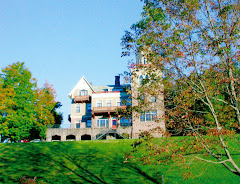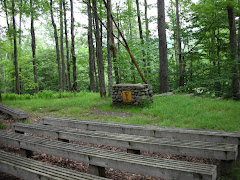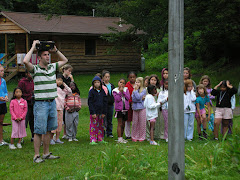 Every summer, during the middle weekend of session 2, the Frost Valley trustees come to camp for a midsummer meeting. I remember as a camp director being both excited and a little put out by all the hullabaloo surrounding these gatherings. Inevitably we would have to put on a little show. But I quickly realized what a benefit this was: the more the trustees came to know what we were doing, the more passionate and invested they would become.
Every summer, during the middle weekend of session 2, the Frost Valley trustees come to camp for a midsummer meeting. I remember as a camp director being both excited and a little put out by all the hullabaloo surrounding these gatherings. Inevitably we would have to put on a little show. But I quickly realized what a benefit this was: the more the trustees came to know what we were doing, the more passionate and invested they would become. For some trustees passion and investment were never issues. Two of those folks are in this picture, taken in July of 1979. That summer our meeting was all the way over at the Straus Estate on the East Branch of the Neversink. With his back to us at right, wearing glasses, is Woodruff (Woody) English, was for many years was the clear-as-a-bell-speaking chairman of the board. Woody was an attorney and always knew exactly what he meant and what he meant was exactly what he said. He spoke so loudly and clearly that I sometimes had the impression that he thought we were learning the vocabulary of his speech as he spoke it. He was teacher-like in that sense. He intuited whatever Halbe needed or wanted. I'm pretty certain the two of them had conversations about some such things, but I also feel sure that at least half the time such chats needn't even take place.
Facing us with arms akimbo in the red shirt is the unforgettable old-style oldster, Harry Lindeman. "The Judge," we called him. He had been a juvenile court judge in New Jersey (in Newark, I think) and had long long years of experience with what was then called delinquents - later "troubled kids." He had a slightly twangy, 19th-century-style story (with a moral or ethical punchline) for nearly every situation. He sometimes told such stories right in the middle of trustee meetings. Harry was frail and hardy at the same time. Halbe would invariably bring Harry into camp and ask me to arrange for a campfire or gathering of several villages or even the whole camp. And Harry would play his harmonica while slapping his knee and doing a frail jig, and then recite a long rhymed narrative poem from the 1880s or 1910s. What a character he was. A real throwback. Here he was, a distinguished jurist whose ideas about saving troubled kids was written up in books (e.g. Matthew Matlin's Crime Prevention through Treatment, 1953), and to us he was a throwback camp guy, an eastern cowboy with big fish tales, a one-man singin'-storytelling band.
Behind Harry, in the yellow top, is Peggy Rub--enormously talented, funny to the point of wackiness. Peg surely gets an entry of her own one day soon. She started at camp the very first summer that we had a girls camp and rose up through to camp director. In '79 she was the Girls' Camp Director (Hird) while I was the Boys' Camp Director (Wawayanda). A lot of energy there.











